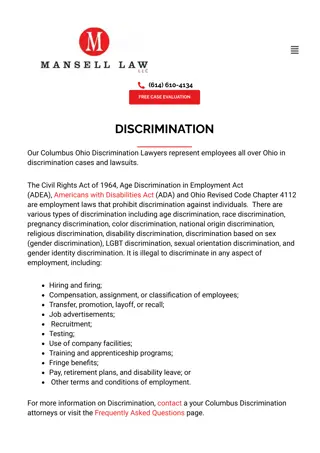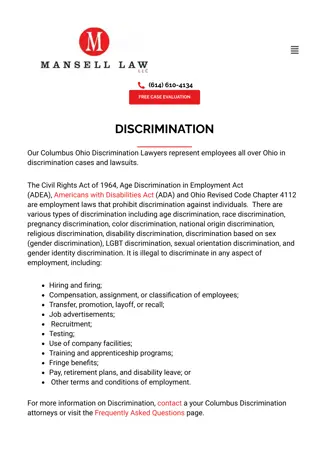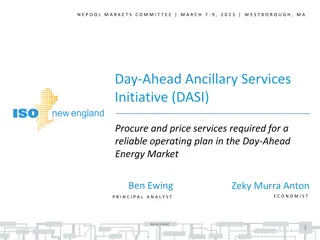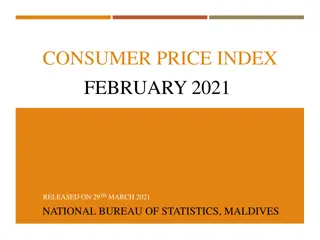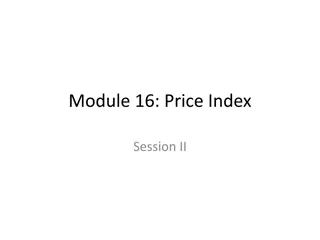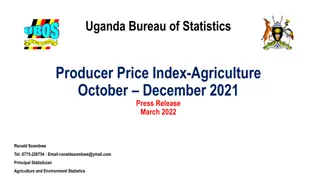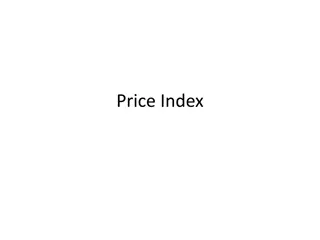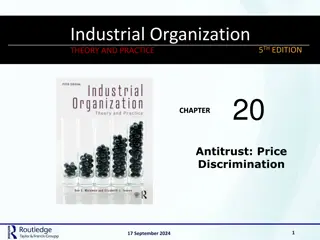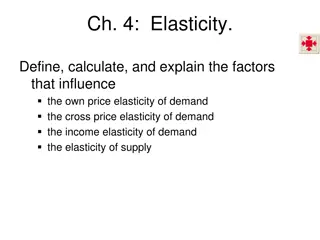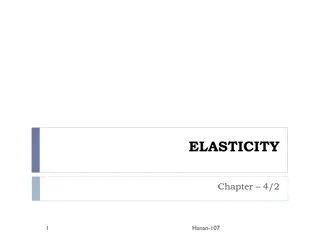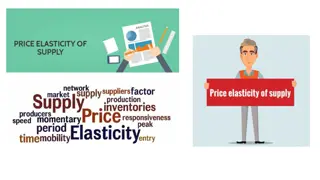International Human Rights Treaties and Recommendations for Combatting Racism
Mila Paspalanova, the Anti-Racial Discrimination Advisor for Europe at OHCHR, discusses core treaties related to racial discrimination, international conventions, and efforts to combat discrimination based on religion or belief. The content highlights the importance of ICERD, ICCPR, and other key tr
6 views • 16 slides
Employment Discrimination Lawyer Columbus Ohio | Discrimination
Facing workplace discrimination in Columbus, Ohio? Get legal help! Employment Discrimination Lawyer Columbus Ohio. We fight for your rights.\n
0 views • 4 slides
Employment Discrimination Lawyer Columbus Ohio | Discrimination
Facing workplace discrimination in Columbus, Ohio? Get legal help! Employment Discrimination Lawyer Columbus Ohio. We fight for your rights.\n
0 views • 4 slides
Understanding Discrimination and Sexual Harassment Policy in AMVETS
This content provides insights into the policy and definitions of discrimination, sexual harassment, and examples within the context of AMVETS organization. It explains the prohibited behaviors, such as gender-based harassment, and outlines the scope of the policy in addressing discrimination based
1 views • 19 slides
Understanding Consumer Demand Principles and Elasticity Theories
Explore the theory of consumer demand, including the principles of price-demand relationship, homogeneity, symmetry, and price elasticity. Delve into the concepts of own-price elasticity, cross-price elasticity, and expenditure elasticity to understand how changes in prices and income affect consume
1 views • 8 slides
Day-Ahead Ancillary Services Initiative: Current Updates and Future Plans
The ISO-NE is introducing the Day-Ahead Ancillary Services Initiative (DASI) to procure and price ancillary services efficiently. Key discussions include the strike price adder approach and the Forward Reserve Market logistics. Stakeholder feedback is sought on the strike price adder concept, with c
0 views • 34 slides
Maximum Price Calculation for Callable Bond with Annual Yield Requirement
A 20-year callable bond example is provided with a $1000 face value and 3% annual coupons, callable at different redemption values over specific years. The task is to determine the maximum price a buyer should pay to achieve a minimum annual yield of 5%. The calculation involves identifying the time
0 views • 33 slides
Consumer Price Index Report for February 2021 Released by National Bureau of Statistics, Maldives
The Consumer Price Index (CPI) report for February 2021 by the National Bureau of Statistics, Maldives, shows a monthly inflation rate of -0.05%. Significant price decreases were observed in mobile communication services, major household appliances, fish, and more, while price increases were noted i
1 views • 11 slides
Overview of Food Price Trends and Consumer Expenditures in the US
The presentation highlights the consumer spending on food, food price trends over time, 2021 food prices, and forecasts for 2022 in a historical context. It emphasizes that U.S. consumers spent 12% of their expenditures on food in 2020, aligning with historical averages. Food price inflation remaine
0 views • 21 slides
Understanding Market Sharing Cartel in Oligopolistic Markets
Market sharing cartels in oligopolistic markets involve firms entering agreements to share the market while retaining some autonomy in their operations. Two main methods are non-price competition and quota systems. Non-price competition involves firms agreeing on a common price to maintain profits w
0 views • 8 slides
Understanding Price Elasticity in Economics
Explore the key concepts of price elasticity in economics, including calculations, determinants, and applications. Understand the differences between price elasticity of demand and supply, learn how to calculate price elasticity, and interpret elasticity coefficients. Discover the responsiveness of
0 views • 31 slides
Understanding Price Indices in Economics
Exploring the concept of price indices in economics, focusing on composite price indexes, weighted and unweighted indices, and their importance in measuring relative prices. A practical illustration using the example of tea consumption showcases how price indices help in understanding cost changes o
0 views • 31 slides
Understanding Price Indices: Introduction, Purpose, and Use
Price indices play a crucial role in measuring changes in purchasing power, inflation, and real values over time. This module provides an in-depth look at price indices, including their definition, key uses, and importance in economic and business contexts. From explaining what price indices are to
0 views • 33 slides
Equality Act 2017: Ensuring Equal Access and Protection from Discrimination
The Equality Act 2017 aims to harmonise and extend statutory protection from discrimination for a wider range of people in various areas such as employment, goods and services, education, public functions, premises, and associations. It identifies nine protected characteristics including race, sex,
3 views • 39 slides
Understanding Discrimination on the Basis of Disability
Manifestation of discrimination based on disability, forms of discrimination, reasonable accommodation, responsibility for combatting discrimination, and the importance of non-discrimination and equality in ensuring human rights and freedoms for persons with disabilities are explored within this mod
1 views • 18 slides
The Work of ACERWC on Racism, Discrimination, and Children's Rights
The African Committee of Experts on the Rights and Welfare of the Child (ACERWC) focuses on issues such as racism, ethnic and religious discrimination, and children's rights. Established in 1990 and ratified by 49 countries, ACERWC ensures non-discrimination, child survival, participation, and devel
0 views • 12 slides
Price-Output Determination Under Low-Cost Price Leadership
Economists have developed models on price-output determination under price leadership, with assumptions about leader and follower behavior. In this scenario, two firms, A and B, with equal market share and homogeneous products, navigate pricing strategies based on cost differentials. Firm A, with lo
1 views • 7 slides
Gender-based Discrimination in Kosovo: Research Findings and Analysis
Research conducted in Kosovo evaluates gender-based discrimination awareness and implementation of legal responsibilities. The study assesses the legal framework, reported cases, public awareness, and institutional response to discrimination. Methodologies included legal analysis, surveys, interview
0 views • 50 slides
Understanding Disability Discrimination Laws in Education
Comprehensive overview of Disability Discrimination Act 1992 (Cth), Disability Standards for Education 2005 (Cth), and the legal framework prohibiting discrimination against students with disabilities. Exploring direct and indirect discrimination, limitations of the DDA, and examples of less favorab
3 views • 40 slides
Application of Price Adjustment in Civil Works Contracts: Lessons from Nigeria
The construction industry faces challenges due to price fluctuations in construction materials, especially in countries with unstable currencies. Civil works contracts funded by the World Bank are eligible for price adjustments if the contract duration exceeds 18 months. This presentation highlights
0 views • 21 slides
Insights on Price Elasticity of Demand and Consumer Behavior
Understanding the concept of price elasticity of demand, this content explores how changes in price affect consumers' buying behavior. It covers the Veblen effect, Giffen goods, Marshall's example on staple foods, and the responsiveness of demand to price fluctuations. The content also explains elas
5 views • 31 slides
Understanding Weighted Price Indices in Economics
Weighted price indices are essential in economics to measure changes in prices over time. Different methods such as Laspeyre's and Paasche's price indices offer ways to calculate these indices using weighted averages. Fisher's index combines both methods to provide a comprehensive view. The weighted
3 views • 9 slides
Price Index Session VII - Designing Price Data Collection System
This session delves into the process of designing a price data collection system, focusing on product specification, setting norms for item substitution, outlet selection, determining frequency and timing, method of data collection, treatment of seasonal products, quality adjustment, and dealing wit
0 views • 47 slides
Understanding Price Determination in Livestock Economics and Marketing
Price determination under perfect competition involves the interaction of demand and supply curves to reach equilibrium, where the quantity demanded and supplied are balanced at an equilibrium price. In perfect competition, price is determined at the point where demand and supply intersect. Demand v
0 views • 16 slides
Uganda Bureau of Statistics Producer Price Index - Agriculture Overview
The Uganda Bureau of Statistics (UBOS) produces and disseminates the Producer Price Index Agriculture to show the farm-gate prices received by farmers for primary agricultural products. The index is used by various stakeholders for policy-making and decision-making purposes. It covers key agricultur
2 views • 26 slides
Preventing Pregnancy-Related Discrimination in Access and Opportunities
This content discusses the importance of preventing pregnancy-related discrimination in access and opportunities, covering relevant laws such as Title IX of the Education Amendments Act of 1972 and Title VII of the Civil Rights Act of 1964. It provides examples of pregnancy discrimination, ways to p
0 views • 20 slides
Understanding Price Index: Issues and Concepts
Price indices play a crucial role in measuring changes in prices of goods and services. This presentation covers the construction of price indices, defining purposes, selecting base periods, assigning weights, and more. Explore the purpose, scope, and coverage of price indices as measures of inflati
0 views • 32 slides
Workplace Discrimination Policies and Procedures at Texas A&M University-Kingsville
Texas A&M University-Kingsville strictly prohibits discrimination based on various factors such as race, color, sex, religion, national origin, disability, and more. Employees are expected to maintain discrimination-free environments and report any discriminatory actions observed or brought to their
0 views • 11 slides
Antitrust and Price Discrimination: Robinson-Patman Act Overview
The Robinson-Patman Act, a significant antitrust statute, aims to prevent price discrimination that harms competition, particularly targeting sellers granting discriminatory prices. While some price discrimination can enhance efficiency, predatory discrimination poses a serious threat to competition
0 views • 30 slides
Training Guidelines and Methodology for Fighting Discrimination
The training module focuses on combating racism, xenophobia, and discrimination through practical exercises and theoretical frameworks. It includes sessions on understanding discrimination, EU frameworks, good practices, and ways to fight against various forms of discrimination. The methodology inco
0 views • 19 slides
Constructing Price Index: General Procedure and Aggregation
The process of constructing a price index involves various steps such as computation of price relatives, aggregation at different levels, selection of base period, and designing data collection methods. Weighted arithmetic mean and simple ratio calculations are used in aggregating price indices. A t
0 views • 31 slides
Understanding Price Elasticity of Demand in Economics
Price elasticity of demand is a crucial concept in economics that measures how much the quantity demanded of a good changes in response to a change in its price. Factors influencing own-price elasticity, cross-price elasticity, income elasticity, and supply elasticity are explained and illustrated u
0 views • 19 slides
Understanding Elasticity in Economics
Elasticity in economics refers to the responsiveness of demand to price changes. A more elastic curve results in larger quantity changes for small price changes, while a less elastic curve requires larger price changes to affect quantity consumed. The elasticity of demand can be measured by calculat
1 views • 13 slides
Understanding Price Elasticity of Supply in Economics
Price elasticity of supply measures how much the quantity supplied responds to changes in price. It can be inelastic (quantity supplied responds slightly), elastic (quantity supplied responds substantially), or unit-elastic (price elasticity of supply equals 1). Various determinants like the passage
0 views • 16 slides
Understanding Degrees of Elasticity of Demand
Elasticity of demand refers to the responsiveness of quantity demanded to changes in price. Perfectly elastic demand occurs when there is an infinite demand at a particular price and demand becomes zero with a slight rise in price. Conversely, perfectly inelastic demand occurs when there is no chang
0 views • 11 slides
Addressing Misconduct and Discrimination at the Swedish Defence University
The Swedish Defence University upholds a zero-tolerance policy against harassment, bullying, and discrimination, actively enforcing laws like the Swedish Discrimination Act. In addition to prohibiting various forms of discrimination, the university is establishing clear rules of order and a code of
0 views • 7 slides
Changes to Price Adjustment Provisions in Construction Management
The content discusses changes in price adjustment provisions for asphalt binder indices, bid indices, and bituminous price adjustment. It covers the removal of standard specifications, the use of specific binder types, and the application of price adjustments on a contract basis. The focus is on usi
0 views • 27 slides
Understanding Price Discrimination in Monopoly Markets
Price discrimination under monopoly occurs when businesses charge different prices to different consumer groups for the same product or service. Conditions for price discrimination include monopoly power, market segmentation, ability to separate consumer groups, and prevention of resale. Examples of
0 views • 12 slides
Understanding Racism, Racial Discrimination, and Xenophobia in the Context of an Anti-Racist Church Advocating for Justice
Racism, racial discrimination, and xenophobia are real issues that impact lives based on color, ethnicity, and cultural background. The International Convention for the Elimination of Racial Discrimination defines racism as promoting racial hatred and discrimination. The World Council of Churches (W
0 views • 9 slides
Understanding the Impact of Discrimination on Health
Exploring the negative effects of discrimination on physical and mental health, this content delves into how experiencing discrimination can lead to illnesses, unhealthy habits, and additional health risks. The concept of positive discrimination to aid discriminated groups is also discussed, highlig
0 views • 20 slides

